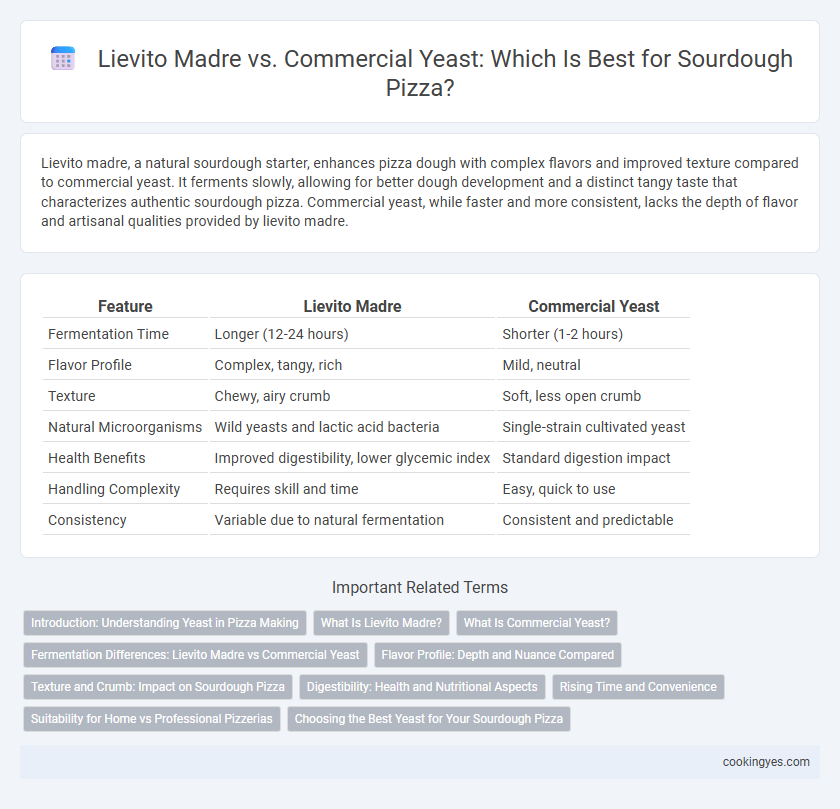Lievito madre, a natural sourdough starter, enhances pizza dough with complex flavors and improved texture compared to commercial yeast. It ferments slowly, allowing for better dough development and a distinct tangy taste that characterizes authentic sourdough pizza. Commercial yeast, while faster and more consistent, lacks the depth of flavor and artisanal qualities provided by lievito madre.
Table of Comparison
| Feature | Lievito Madre | Commercial Yeast |
|---|---|---|
| Fermentation Time | Longer (12-24 hours) | Shorter (1-2 hours) |
| Flavor Profile | Complex, tangy, rich | Mild, neutral |
| Texture | Chewy, airy crumb | Soft, less open crumb |
| Natural Microorganisms | Wild yeasts and lactic acid bacteria | Single-strain cultivated yeast |
| Health Benefits | Improved digestibility, lower glycemic index | Standard digestion impact |
| Handling Complexity | Requires skill and time | Easy, quick to use |
| Consistency | Variable due to natural fermentation | Consistent and predictable |
Introduction: Understanding Yeast in Pizza Making
Lievito madre, a natural sourdough starter, offers complex flavor profiles and extended fermentation times compared to commercial yeast, which provides rapid rise and consistent results. The natural wild yeast and bacteria in lievito madre enhance dough elasticity and digestibility, contributing to a traditional sourdough texture. Commercial yeast contains Saccharomyces cerevisiae strains optimized for quick leavening, making it ideal for faster pizza production without sacrificing basic crust structure.
What Is Lievito Madre?
Lievito madre is a natural sourdough starter made from a mixture of flour and water, cultivated over time to develop a stable culture of wild yeast and lactic acid bacteria. Unlike commercial yeast, which consists of a single strain of Saccharomyces cerevisiae, lievito madre offers a complex microbial community that enhances flavor, texture, and fermentation control in sourdough pizza dough. This traditional Italian starter contributes to a longer fermentation process, resulting in a more aromatic crust with a balanced tangy taste and improved digestibility.
What Is Commercial Yeast?
Commercial yeast, often Saccharomyces cerevisiae, is a highly active and consistent leavening agent used in sourdough pizza to rapidly ferment dough, producing reliable rise and texture. Unlike lievito madre, which is a natural, slow-fermenting wild yeast culture, commercial yeast allows for predictable fermentation times and is widely available in fresh or dry forms. Its ability to quickly produce carbon dioxide makes commercial yeast ideal for efficient dough preparation without sacrificing the classic tangy flavor of sourdough.
Fermentation Differences: Lievito Madre vs Commercial Yeast
Lievito madre, a natural sourdough starter, ferments dough more slowly than commercial yeast, resulting in complex organic acids and enhanced flavor profiles in pizza crust. Commercial yeast activates rapidly, producing carbon dioxide quickly for faster rise but with simpler flavor development. The gradual fermentation with lievito madre improves dough texture and digestibility by promoting lactic acid bacteria activity.
Flavor Profile: Depth and Nuance Compared
Lievito madre imparts a complex flavor profile to sourdough pizza, characterized by subtle fruity and tangy notes with a rich depth developed through extended fermentation. Commercial yeast produces a faster rise but results in a simpler, less nuanced taste with fewer aromatic compounds. The natural fermentation of lievito madre enhances the pizza's overall flavor complexity, creating a more artisanal and distinctive eating experience.
Texture and Crumb: Impact on Sourdough Pizza
Lievito madre enhances sourdough pizza with a more open, airy crumb and a chewy, tender texture due to its slow fermentation and natural yeast strains. Commercial yeast produces a quicker rise, resulting in a denser crumb and less complex texture. The natural fermentation of lievito madre also improves dough elasticity and flavor depth, essential for artisan sourdough pizza quality.
Digestibility: Health and Nutritional Aspects
Lievito madre enhances sourdough pizza digestibility by promoting longer fermentation, which breaks down gluten and phytic acid, improving nutrient absorption and reducing gastrointestinal discomfort. Commercial yeast ferments rapidly, often leaving residual compounds that may cause bloating or indigestion in sensitive individuals. Nutritionally, pizzas made with lievito madre offer higher bioavailability of minerals and a more balanced gut microbiome due to the presence of beneficial lactic acid bacteria.
Rising Time and Convenience
Lievito madre requires a longer rising time, often 12 to 24 hours, which enhances flavor complexity and dough texture in sourdough pizza. Commercial yeast offers rapid fermentation, typically rising within 1 to 2 hours, providing unmatched convenience for quick preparation. Choosing between lievito madre and commercial yeast depends on whether depth of flavor or speed is prioritized in the pizza-making process.
Suitability for Home vs Professional Pizzerias
Lievito madre offers a complex flavor profile and natural fermentation ideal for artisanal sourdough pizza, making it suitable for professional pizzerias seeking authentic taste and texture. Commercial yeast provides faster rise times and consistent results, preferred by home bakers and high-volume pizza shops prioritizing efficiency and predictability. Home kitchens benefit from commercial yeast due to ease of use, while professionals leverage lievito madre for its depth and unique fermentation qualities.
Choosing the Best Yeast for Your Sourdough Pizza
Lievito madre offers a unique fermentation profile with complex flavors and enhanced dough elasticity, making it ideal for artisanal sourdough pizzas, while commercial yeast provides faster rise times and more consistent results. For sourdough pizza, choosing lievito madre promotes natural leavening and depth in taste, although it requires longer proofing periods and careful maintenance. Commercial yeast suits those seeking efficiency and uniform texture, but may lack the distinctive sourdough tang and extended shelf life linked to natural starters.
Lievito madre vs Commercial yeast for sourdough pizza Infographic

 cookingyes.com
cookingyes.com